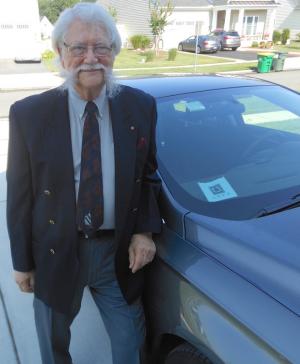Uber driver questions need for local business licenses
Uber driver and Lewes resident Harris Marx had a wry smile when he was told Aug. 12 that he had created a mini firestorm by contacting local media outlets about an unpleasant experience he had in Dewey Beach.
He said he wasn’t surprised, and that he did it because he wanted to let other Uber drivers to be aware of the stance Dewey Beach was taking on the riding-sharing company.
Marx sent a letter to the Cape Gazette offices Aug. 10 accusing a Dewey police officer of bullying him and the customers he picked up during an incident Aug. 7. He said he was aggressively asked by a police officer if he had a business license for the town, and that if he did not, he had to leave immediately.
“As I was about to roll up my window and leave he said, “Remember, if you are seen picking up passengers in Dewey, you will get a ticket, be arrested and thrown in jail, plus your car will be impounded,” he wrote.
Marc Appelbaum, Dewey Beach town manager, doesn’t defend the officer’s actions. He said he hadn’t spoken with the officer directly, but agrees that if the letter is accurate the situation was handled poorly. The language and attitude described in the letter is inappropriate, he said.
Where Appelbaum doesn’t see eye-to-eye with Marx is the issue of having a business license. He said there have been more than 100 of the $109-licenses issued by the town to taxi, limousine and pedicab services since April 1.
“Why is Uber any different?,” he said, adding that not all Uber drivers think they're different – included in the license total, he said, are 13 Uber drivers.
Uber has been in Delaware for the better part of a year, but it was unregulated. The company was given the state’s blessing to operate in Delaware in mid-June when the Delaware Department of Transportation and the ride-sharing company signed a Memorandum of Understanding. The agreement establishes requirements for Uber and drivers who use its platform to operate in Delaware, including background check requirements, minimum insurance coverage, and other standards to promote safe and responsible service.
Under the agreement, drivers authorized to use the company’s platform must also meet licensing and vehicle requirements and will be prohibited from picking up or soliciting riders from a designated street hail area, such as those located in front of train stations and airports.
Drivers are also required to obtain a valid business license from the state, which costs $45 for taxi services.
Kelly Bachman, a spokeswoman for Gov. Jack Markell, said the MOU did not address local business licenses because those requirements differ from town to town, and the need for a license in a particular town will depend on the service area of the driver.
David Hastings has more than 20 years of transportation experience as president and owner of the Jolly Trolley. He said the company is supportive of the technology and its potential to create jobs, but, Hastings continued, an enforceable framework for collecting taxes and proper insurance coverage needs to be in place.
The list of requirements associated with a license to commercially transport people, said Hastings in an email, includes bi-annual vehicle inspections, drug testing, business license fees, taxes that help maintain roads, regular background checks from the state and federal government, and clearly identifiable public transit vehicle markings.
Hasting said services available for public conveyance need to essentially be on a level playing field for public safety and taxing issues.
“To destroy small transit companies in an unfair manner is down right wrong,” he wrote. “It all just needs to be apples to apples when setting up the final rules and integrating this most amazing of advances into the people transit industry.”
Marx said he began working as an Uber driver in January to help pay for the gas and tolls associated with his other job as managing partner for Delmarva Distributing, which specializes in e-cigarettes, e-hookahs and e-cigars. He said his territory includes all of Maryland, Delaware and Virginia’s eastern shore.
“I travel all over, and gas and tolls are expensive,” he said. “I figured this was a way to help cut down on the company’s transportation costs.”
Marx said he only does Uber locally on the weekends.
Sharon Lynn, Rehoboth Beach city manager, echoed Appelbaum’s sentiments on Uber drivers getting a business permit.
“I do believe a Uber driver needs to register and be licensed in the city as other taxi drivers are mandated,” she wrote in an email.
Lynn said a business license for each taxi driver in Rehoboth is $325, and, she continued, usually the company files these on behalf of the drivers and pays the fee.
Marx said the idea of him having to register with each town he might do business in doesn’t make sense, and would be cost prohibitive.
“Being a small business, if I had to pay permit fees in every place I drive, it would cost thousands and thousands of dollars,” he said.
Marx said he knows of other other delivery businesses who don’t have licenses (food delivery trucks for example) in Dewey, and he doesn’t know why he’s being singled out.
Appelbaum said he wasn’t aware of any of these businesses without licenses. He said companies like UPS, Fed Ex and Home Depot all have the required licenses despite not having a physical location in town.
Appelbaum said he understands the popularity of the service Uber provides, and the town supports any business that provides a way for people who have been drinking to get home safely.
Appelbaum said he recognizes internet-based ride-sharing applications are a new phenomenon and towns are just now beginning to deal with it. He said it would be an issue brought up to town council in the fall after the town has successfully made it through the busy time of year.
Until then, Appelbaum recommended Uber drivers, or drivers using any other internet-based ride sharing service like Lyft or Sidecar, get a business license, because, he said, “any other cab or taxi company has to do.”
Chris Flood has been working for the Cape Gazette since early 2014. He currently covers Rehoboth Beach and Henlopen Acres, but has also covered Dewey Beach and the state government. He covers environmental stories, business stories and random stories on subjects he finds interesting, and he also writes a column called Choppin’ Wood that runs every other week. He’s a graduate of the University of Maine and the Landing School of Boat Building & Design.














































